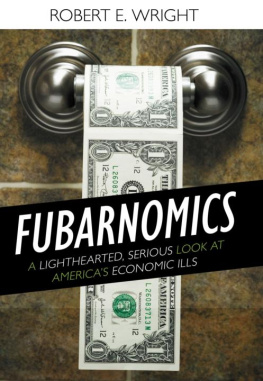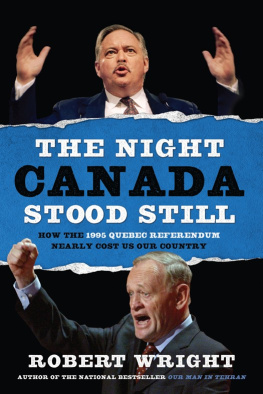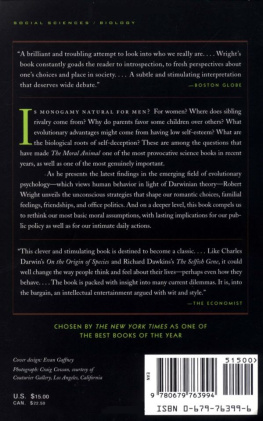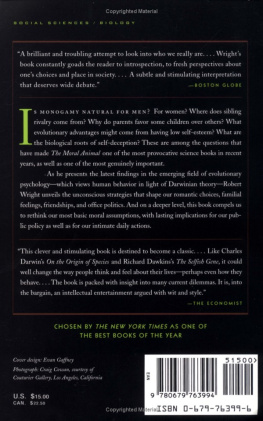Robert E. Wright - Fubarnomics: A Lighthearted, Serious Look at Americas Economic Ills
Here you can read online Robert E. Wright - Fubarnomics: A Lighthearted, Serious Look at Americas Economic Ills full text of the book (entire story) in english for free. Download pdf and epub, get meaning, cover and reviews about this ebook. year: 2010, publisher: Prometheus Books, genre: Politics. Description of the work, (preface) as well as reviews are available. Best literature library LitArk.com created for fans of good reading and offers a wide selection of genres:
Romance novel
Science fiction
Adventure
Detective
Science
History
Home and family
Prose
Art
Politics
Computer
Non-fiction
Religion
Business
Children
Humor
Choose a favorite category and find really read worthwhile books. Enjoy immersion in the world of imagination, feel the emotions of the characters or learn something new for yourself, make an fascinating discovery.
- Book:Fubarnomics: A Lighthearted, Serious Look at Americas Economic Ills
- Author:
- Publisher:Prometheus Books
- Genre:
- Year:2010
- Rating:4 / 5
- Favourites:Add to favourites
- Your mark:
- 80
- 1
- 2
- 3
- 4
- 5
Fubarnomics: A Lighthearted, Serious Look at Americas Economic Ills: summary, description and annotation
We offer to read an annotation, description, summary or preface (depends on what the author of the book "Fubarnomics: A Lighthearted, Serious Look at Americas Economic Ills" wrote himself). If you haven't found the necessary information about the book — write in the comments, we will try to find it.
Fubarnomics: A Lighthearted, Serious Look at Americas Economic Ills — read online for free the complete book (whole text) full work
Below is the text of the book, divided by pages. System saving the place of the last page read, allows you to conveniently read the book "Fubarnomics: A Lighthearted, Serious Look at Americas Economic Ills" online for free, without having to search again every time where you left off. Put a bookmark, and you can go to the page where you finished reading at any time.
Font size:
Interval:
Bookmark:


ROBERT E. WRIGHT


Have we not suffered ourselves to be deceived by political demagogues and impostors, into this fatal thralldom, which without our timely and vigorous exertions, will terminate in the total destruction of our invaluable republican institutions?
-Anonymous, Cause of, and Cure for, Hard Times: A Definition of the Attributes and Qualities Indispensable in Money as a Medium of Commerce
Political realists may actually find comfort in the obvious futility of present policy. Who knows how many Americans may have learned salutary lessons from these depressing years?
-Rexford G. Tugwell, Mr. Hoover's Economic Policy
 ver wonder why so many college students spend more time working and partying than studying? Why we allow six guys in hardhats to stand around doing nothing while traffic snarls? Why you have to pay thousands of dollars for "title insurance" if you buy a house that's not located in Iowa? Why you can't refinance your home mortgage because other people stopped paying on theirs?1 Why our forebears enslaved millions of people for a couple of centuries, then to end the institution fought a war so costly and bloody it would have been far cheaper to buy and free the slaves instead? How in the early 1930s one out of four adults went hungry as they searched for work while the government destroyed large quantities of food? Why ever since then young people in lousy jobs with small children are forced to pay a large percentage of their incomes to people who had decades to work and save? How healthcare and health insurance got so damn expensive? If you've asked yourself any of these or similar questions, or gotten queasy contemplating what passes for economic analysis in the media, this book is for you.
ver wonder why so many college students spend more time working and partying than studying? Why we allow six guys in hardhats to stand around doing nothing while traffic snarls? Why you have to pay thousands of dollars for "title insurance" if you buy a house that's not located in Iowa? Why you can't refinance your home mortgage because other people stopped paying on theirs?1 Why our forebears enslaved millions of people for a couple of centuries, then to end the institution fought a war so costly and bloody it would have been far cheaper to buy and free the slaves instead? How in the early 1930s one out of four adults went hungry as they searched for work while the government destroyed large quantities of food? Why ever since then young people in lousy jobs with small children are forced to pay a large percentage of their incomes to people who had decades to work and save? How healthcare and health insurance got so damn expensive? If you've asked yourself any of these or similar questions, or gotten queasy contemplating what passes for economic analysis in the media, this book is for you.
In terms of the actual value of stuff and services that the average American produces in a year (in the language of economists, real per capita gross domestic product), the US economy is among the best in the world and has been for two centuries. Since World War II, American labor productivity (the inflation-adjusted value of output per hour worked) has more than trebled.' It may seem strange to call such an economy FUBAR, an acronym apparently coined by the salty tongues of GIs during World War II that stands for fouled (ahem!) up beyond all recognition. Compared to most other national economies, the US economy is a clear winner. But its success is relative, not absolute, because even the American juggernaut finds itself weighted down by inefficient institutions and sagging sectors. This book discusses some of those ugly spots and, in the final chapter, proffers some tentative guidelines for their eradication or amelioration. If we bring lagging industries, such as construction, higher education, healthcare, and social insurance, up to speed, we will prosper as never before and free up resources to tackle other pressing problems, such as global climate change, predatory government, and terrorism.
Unfortunately, at present, the United States appears headed down a much less happy path. The late, great University of Maryland economist Mancur Olson argued that as nations age, their economies become inflexible due to the accumulated weight from special-interest legislation, from the ever-increasing number of laws enacted to aid the few at the expense of the many3 The American economy is no exception. From Washington, DC, Congressman John Murtha ensured that "pork," in the form of government contracts, poured into his district in western Pennsylvania. Many of the federal contracts that Murtha's favorite Johnstown-area firms won were "no-bid" deals. In other words, the companies faced no competition, virtually ensuring that they would reap large profits, ill-gotten gains sucked straight out of the taxpayers' pockets. And it gets worse, believe it or not. Many of those contracts were for goods or services that no branch of the military or government agency actually wanted or requested. If one of Murtha's favored firms made it, the government got it, whether it wanted it or not.4
Meanwhile, with the post-Katrina cleanup still far from finished, Senator Ted Stevens of Alaska tried to divert over $200 million to build a bridge to connect a small Alaskan town to a tiny island inhabited by about fifty people. The notorious "Bridge to Nowhere," as critics dubbed it, was snubbed even by locals who had gotten around quite well for generations by boat and airplane, thank you. (Small, private planes are ubiquitous in Alaska.)' If Murtha and Stevens were some sort of renegade exceptions to the rule, we would have little to worry about. Unfortunately, almost everyone in Congress relishes pork projects, or "earmarks" as they have come to be known.
Unelected bureaucrats, from the recalcitrant clerk at the department of motor vehicles to a GS-1 5 Step 10-the top of the federal government's "general schedule" of pay for bureaucrats-are also major contributors to FUBAR. Governments fail, or create FUBAR conditions, for a variety of reasons. Foremost, reality is a real bitch to understand. Only with considerable effort can the best and the brightest barely fathom its shadowy depths. Information about how the world works is scarce and imperfect, so trying to envision the future is daunting. Systems are chaotic, in the sense that small changes in initial conditions can lead to large differences in outcomes. (Watch The Butterfly Effect for an inkling.) A seemingly small policy change can ripple through the economy, destroying equilibrium the way a tossed pebble wreaks havoc on the surface of a placid pond. Unlike the pond, however, the economy doesn't necessarily return to its former state. Rather, like a human face, it may forever bear the scar created by the illconceived shock of a rock .6
Governments also fail because they are composed of fallible people. Sometimes their foibles induce them to make very well-intentioned mistakes. More often, though, their flaws lead them to satisfy their own wishes and purses, instead of those of the people they ostensibly serve. In some countries, including the United States, private interestedness is checked by elections or other parts of the government-you know, the three branches of government, the bicameral legislature, federalism, and all that. Selfinterested behavior still pervades public life, but it is more muted than in Joe Stalin's Soviet Union or Bobby Mugabe's Zimbabwe. Instead of outright theft, American politicians and bureaucrats must engage in more oblique, and hence in some ways more insidious, self-serving activities. Earmarks, campaign contributions, vote swapping, work slowdowns, extralong lunches, Luddite-like resistance to technology, and regulatory forbearance are only a few such behaviors.
Font size:
Interval:
Bookmark:
Similar books «Fubarnomics: A Lighthearted, Serious Look at Americas Economic Ills»
Look at similar books to Fubarnomics: A Lighthearted, Serious Look at Americas Economic Ills. We have selected literature similar in name and meaning in the hope of providing readers with more options to find new, interesting, not yet read works.
Discussion, reviews of the book Fubarnomics: A Lighthearted, Serious Look at Americas Economic Ills and just readers' own opinions. Leave your comments, write what you think about the work, its meaning or the main characters. Specify what exactly you liked and what you didn't like, and why you think so.












